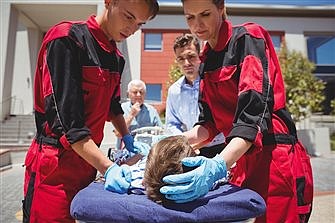A note of thanks to first responders, police and the National Guard
January 28, 2021 at 11:40 a.m.

During the Washington lockdown before the inauguration, I talked with U.S. Capitol and Supreme Court police and the National Guard. As I left them, I felt a beautiful feeling of belonging.
The reason for this sentiment came from my father being a Chicago fireman. I was also a fireman and taught in a police academy. I was among first responders whom I deeply respect. My esteem comes from experiencing the way they react when dealing with life's darker side.
Once when responding to a house fire with the police, we found ourselves in the middle of a family feud over who caused the fire. Nor will I ever forget how an officer, doctor and myself responded to a crib death. Both occasions were charged with overwhelming tension, but in each one, these people exuded professional calmness and skills. We were a cohesive team fulfilling our duties as one.
[[In-content Ad]]
During conversations with the police and National Guard, a moment I experienced as a boy came to mind. I was with my dad in the backyard. Suddenly, he saw smoke coming from the house next door. Vaulting over a high fence, he raced into the building and extinguished the fire. No concern for his safety – he was a first responder doing his duty.
The Greek poet Homer considered duty the real mark of the nobleman. For Homer, a nobleman is happily judged by a severe measure – his sense of duty.
As inspiring as it is to fulfill our duty, it comes with a price requiring the sacrifice of comforts and even sometimes life itself. It is not for the weak-hearted. And yet when we seek wherein lies its inspiration, our difficult effort to practice it is worth the price for achieving it.
Here we are pointed to the life of Christ that contains the essence of duty's inspiration. His glory is fulfilling his duty to do the Father's will. As Homer notes and Christ practiced, duty is an eternal ideal – the epitome of our God-given meaning.
Related Stories
Monday, November 25, 2024
E-Editions
Events
During the Washington lockdown before the inauguration, I talked with U.S. Capitol and Supreme Court police and the National Guard. As I left them, I felt a beautiful feeling of belonging.
The reason for this sentiment came from my father being a Chicago fireman. I was also a fireman and taught in a police academy. I was among first responders whom I deeply respect. My esteem comes from experiencing the way they react when dealing with life's darker side.
Once when responding to a house fire with the police, we found ourselves in the middle of a family feud over who caused the fire. Nor will I ever forget how an officer, doctor and myself responded to a crib death. Both occasions were charged with overwhelming tension, but in each one, these people exuded professional calmness and skills. We were a cohesive team fulfilling our duties as one.
[[In-content Ad]]
During conversations with the police and National Guard, a moment I experienced as a boy came to mind. I was with my dad in the backyard. Suddenly, he saw smoke coming from the house next door. Vaulting over a high fence, he raced into the building and extinguished the fire. No concern for his safety – he was a first responder doing his duty.
The Greek poet Homer considered duty the real mark of the nobleman. For Homer, a nobleman is happily judged by a severe measure – his sense of duty.
As inspiring as it is to fulfill our duty, it comes with a price requiring the sacrifice of comforts and even sometimes life itself. It is not for the weak-hearted. And yet when we seek wherein lies its inspiration, our difficult effort to practice it is worth the price for achieving it.
Here we are pointed to the life of Christ that contains the essence of duty's inspiration. His glory is fulfilling his duty to do the Father's will. As Homer notes and Christ practiced, duty is an eternal ideal – the epitome of our God-given meaning.










